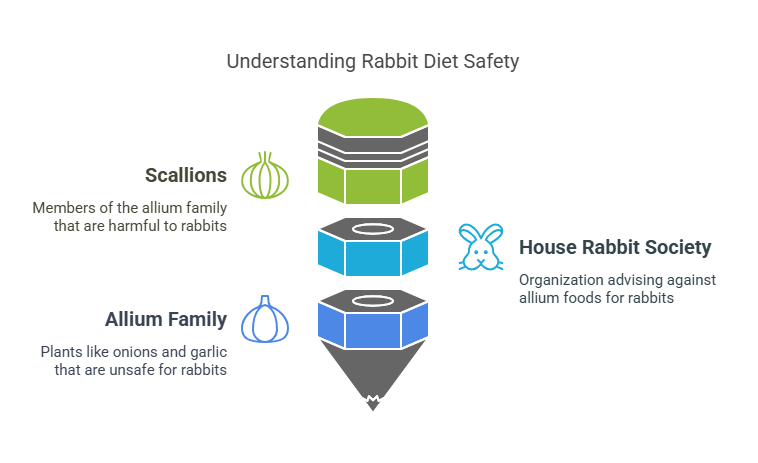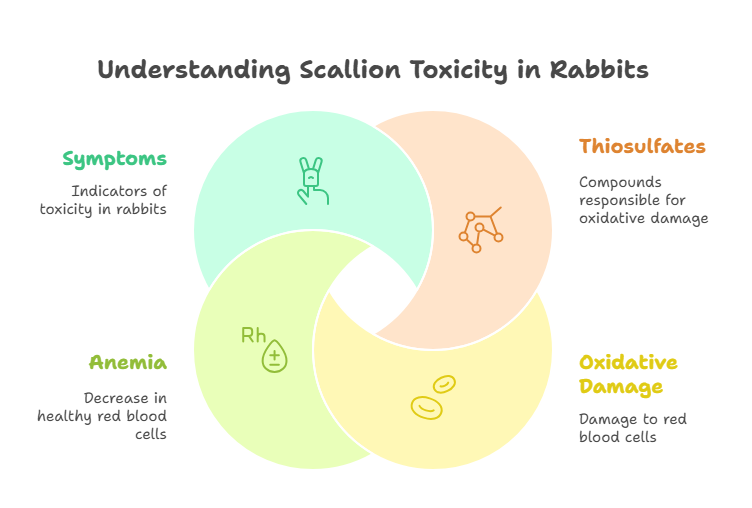No, Rabbits shouldn’t eat scallions as they can cause health issues. Stick to rabbit-safe veggies like romaine lettuce and bell peppers.
Can Rabbits Eat Scallions?
If you’re a rabbit owner, you likely want to give your furry friend the best diet possible. A healthy and varied diet is key to keeping your pet rabbit happy and well-fed. But sometimes, it can be difficult to know which foods are safe for them to eat. One food that might come to mind is scallions (also known as green onions). Can rabbits eat scallions? Are they safe or harmful? Let’s dive into the details.
According to the House Rabbit Society,
“Rabbits should never eat foods from the allium family, including onions, garlic, and leeks.”

What Are Scallions?
Scallions, or green onions, are a type of vegetable closely related to onions. They have long, thin stalks and a mild, slightly spicy flavor. Both the white and green parts of scallions are commonly eaten raw in salads, sandwiches, and other dishes. While humans enjoy them as a garnish or in cooking, you may wonder if these vegetables are safe for rabbits to consume
Can Rabbits Eat Scallions? The Short Answer
No, rabbits should not eat scallions. Scallions, along with other types of onions, can be harmful to rabbits. The main reason is that onions contain compounds that are toxic to rabbits. These compounds can cause serious health problems, including damage to their red blood cells. This leads to a condition called hemolytic anemia, which can be life-threatening.
Why Are Scallions Dangerous for Rabbits?
Scallions belong to the allium family, which also includes garlic, onions, and leeks. These vegetables contain thiosulfates, compounds that are toxic to many animals, including rabbits. Thiosulfates can cause oxidative damage to the red blood cells, leading to their destruction. This results in a decrease in the number of healthy red blood cells in your rabbit’s body, which can lead to anemia.
The symptoms of onion toxicity in rabbits can include:
- Lethargy or weakness
- Decreased appetite
- Pale gums
- Rapid breathing
- Dark-colored urine
If you notice any of these symptoms after your rabbit eats scallions, you should contact your veterinarian immediately.

What About Other Types of Onions?
Scallions aren’t the only type of onion that is harmful to rabbits. All types of onions, including red, yellow, and white onions, contain thiosulfates. Even small amounts of these onions can cause harm to your pet rabbit. Garlic and leeks also belong to the same allium family and should be avoided as well.
It’s best to steer clear of any food that contains onions or garlic in your rabbit’s diet.
Are There Any Safe Vegetables for Rabbits?
While scallions and other onions are not safe for rabbits, there are plenty of vegetables that are. Some safe vegetables for rabbits include:
- Carrots
- Romaine lettuce
- Kale
- Spinach
- Cilantro
- Parsley
- Bell peppers
- Dandelion greens
These vegetables are healthy, low-calorie options that provide essential nutrients for your rabbit. Always introduce new vegetables to your rabbit’s diet slowly to monitor for any allergic reactions or digestive issues.
How Much Should Rabbits Eat?
A rabbit’s diet should consist mainly of hay, with a small amount of fresh vegetables and a few pellets. Hay helps keep your rabbit’s digestive system healthy, while vegetables provide essential vitamins and minerals. Pellets should only make up a small portion of their daily intake.
The majority of a rabbit’s diet should consist of hay, such as timothy hay or meadow hay. Fresh vegetables should account for about 1-2 cups per 6 pounds of body weight daily, while pellets should be limited to about ¼ cup per 6 pounds of body weight.
The American Veterinary Medical Association also stresses that
“Allium species, including onions and garlic, contain compounds that can lead to oxidative damage in rabbits.”
Can Rabbits Eat Scallions in Small Amounts?
Even in small amounts, scallions should not be fed to rabbits. The toxic effects of thiosulfates can still cause harm, even if consumed in small quantities. There is no safe amount of scallions for rabbits, so it’s best to avoid them entirely.
What Should You Do If Your Rabbit Eats Scallions?
If your rabbit eats a small amount of scallions, don’t panic. The first step is to monitor your rabbit closely for any signs of illness. If you notice symptoms such as weakness, lethargy, or changes in their breathing or urine color, seek immediate veterinary care.
If your rabbit has consumed a large amount of scallions or other toxic food, your vet may recommend treatments such as:
- Inducing vomiting
- Administering activated charcoal to prevent further absorption
- Giving intravenous fluids to support kidney function
- Blood tests to check for anemia
What Are the Alternatives to Scallions for Rabbits?
If you’re looking to treat your rabbit to something healthy and flavorful, there are plenty of safe alternatives to scallions. You can offer your rabbit herbs like parsley, cilantro, and basil. These herbs are not only safe, but they also add variety to your rabbit’s diet.
For a crunchy treat, try offering small amounts of bell peppers or carrots. These vegetables are not only safe but also help promote dental health by encouraging your rabbit to chew.
According to a 2024 report by the American Rabbit Breeders Association, approximately 70% of rabbit owners have mistakenly fed their rabbits toxic foods like onions or garlic. This highlights the need for more education on what’s safe for rabbits to consume. Source: ARBA
Can Scallions Be Used in Rabbit Treats?
Because scallions are toxic to rabbits, they should never be used in homemade rabbit treats. There are plenty of safe and healthy options available, including fresh herbs, leafy greens, and even small pieces of fruit. Always ensure that the ingredients you use in rabbit treats are safe for their consumption.
How to Safeguard Your Rabbit’s Diet
As a responsible pet owner, it’s important to ensure that your rabbit’s diet is safe and balanced. Some general tips for feeding your rabbit include:
- Provide Fresh Hay Daily: Hay should make up the majority of your rabbit’s diet, as it helps with digestion and keeps their teeth healthy.
- Offer Fresh Vegetables: Aim for a variety of safe vegetables, but avoid harmful ones like onions, garlic, and scallions.
- Limit Pellets: Pellets are meant to supplement your rabbit’s diet, not replace fresh hay and vegetables. Feed them in moderation.
- Fresh Water: Always provide access to clean, fresh water.
FAQ Section
1. Can rabbits eat onions?
No, rabbits should not eat onions. Onions, including scallions, contain thiosulfates, which are toxic to rabbits and can cause anemia.
2. What are the signs of onion poisoning in rabbits?
Signs of onion poisoning include lethargy, weakness, pale gums, and dark-colored urine. If your rabbit exhibits these symptoms, contact a vet immediately.
3. Can rabbits eat garlic?
No, garlic is also toxic to rabbits and can cause similar issues as onions. It should be avoided in their diet.
4. What vegetables are safe for rabbits to eat?
Safe vegetables for rabbits include leafy greens like romaine lettuce, cilantro, parsley, and bell peppers. Always introduce new vegetables gradually.
5. Can rabbits eat herbs like cilantro and basil?
Yes, cilantro and basil are safe and healthy for rabbits. They can be given as a treat in small amounts.
By understanding what foods are safe and which to avoid, you can ensure your rabbit stays healthy and happy. While scallions may seem like an innocuous food, they pose serious health risks to rabbits. Stick to safe, rabbit-friendly vegetables and consult with your vet if you’re ever uncertain about your rabbit’s diet.
